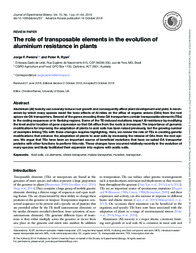The role of transposable elements in the evolution of aluminium resistance in plants.
The role of transposable elements in the evolution of aluminium resistance in plants.
Author(s): PEREIRA, J. F.; RYAN, P. R.
Summary: Abstract Aluminium (Al) toxicity can severely reduce root growth and consequently affect plant development and yield. A mechanism by which many species resist the toxic effects of Al relies on the efflux of organic anions (OAs) from the root apices via OA transporters. Several of the genes encoding these OA transporters contain transposable elements (TEs) in the coding sequences or in flanking regions. Some of the TE-induced mutations impact Al resistance by modifying the level and/or location of gene expression so that OA efflux from the roots is increased. The importance of genomic modifications for improving the adaptation of plants to acid soils has been raised previously, but the growing number of examples linking TEs with these changes requires highlighting. Here, we review the role of TEs in creating genetic modifications that enhance the adaptation of plants to acid soils by increasing the release of OAs from the root apices. We argue that TEs have been an important source of beneficial mutations that have co-opted OA transporter proteins with other functions to perform this role. These changes have occurred relatively recently in the evolution of many species and likely facilitated their expansion into regions with acidic soils.
Publication year: 2018
Types of publication: Journal article
Unit: Embrapa Dairy Cattle
Keywords: Acid soils, Cis elements, Citrate transporter, Malate transporter, Mutation, Transposon
Observation
Some of Embrapa's publications are published as ePub files. To read them, use or download one of the following free software options to your computer or mobile device. Android: Google Play Books; IOS: iBooks; Windows and Linux: Calibre.
Access other publications
Access the Agricultural Research Database (BDPA) to consult Embrapa's full library collection and records.
Visit Embrapa Bookstore to purchase books and other publications sold by Embrapa.

